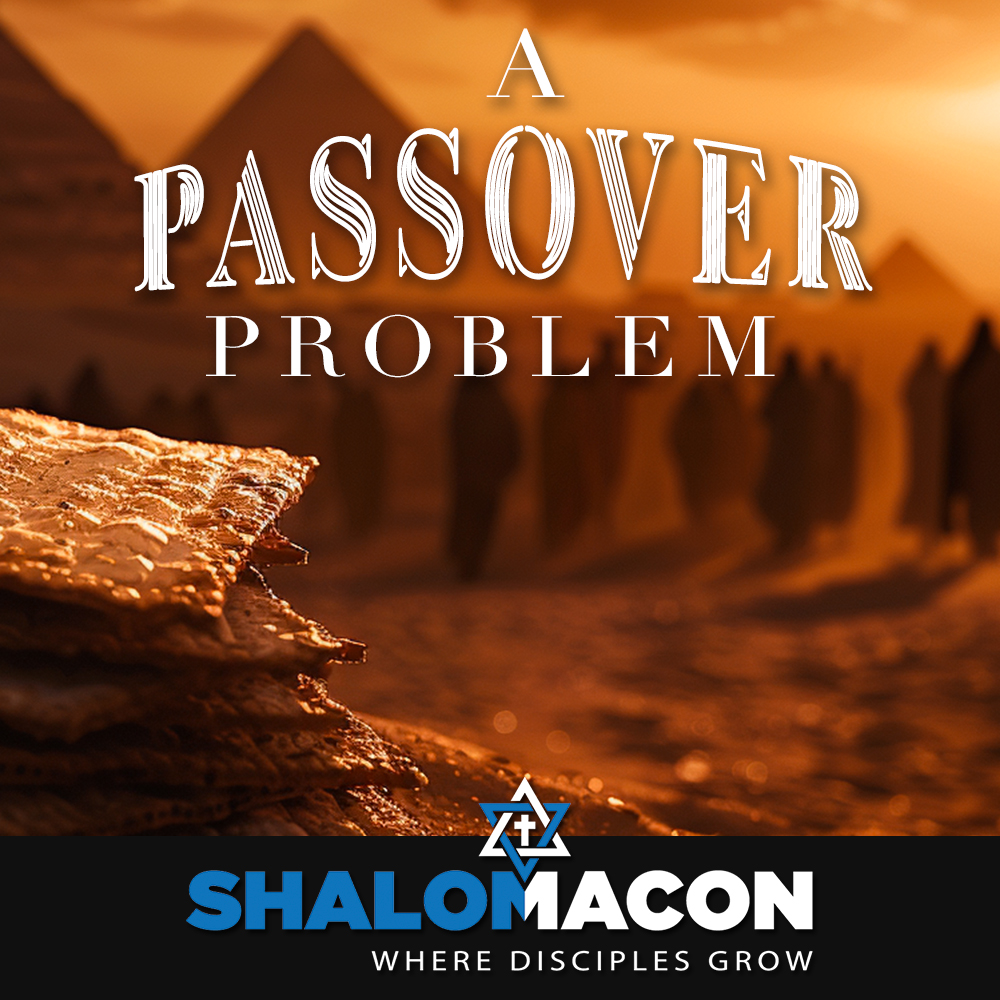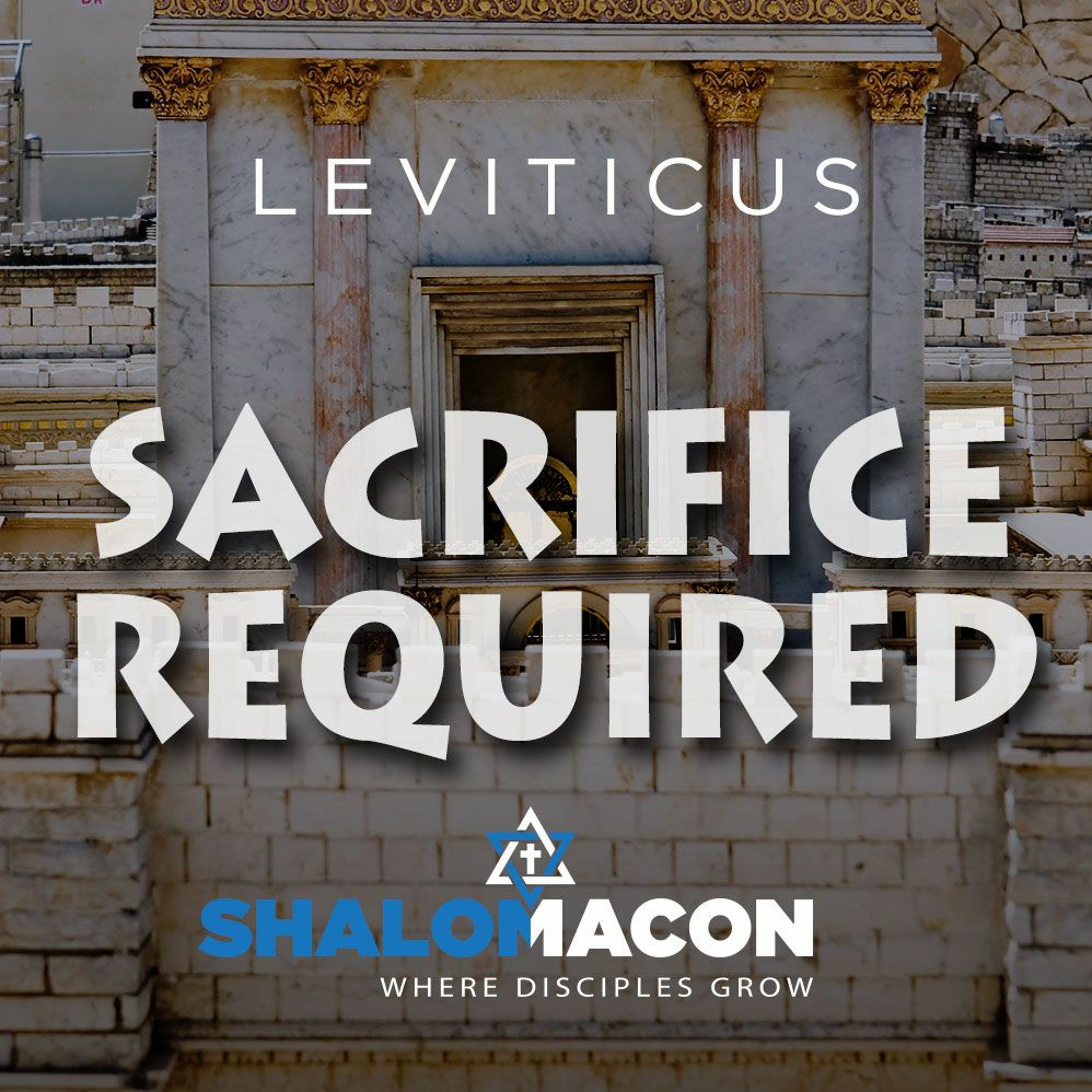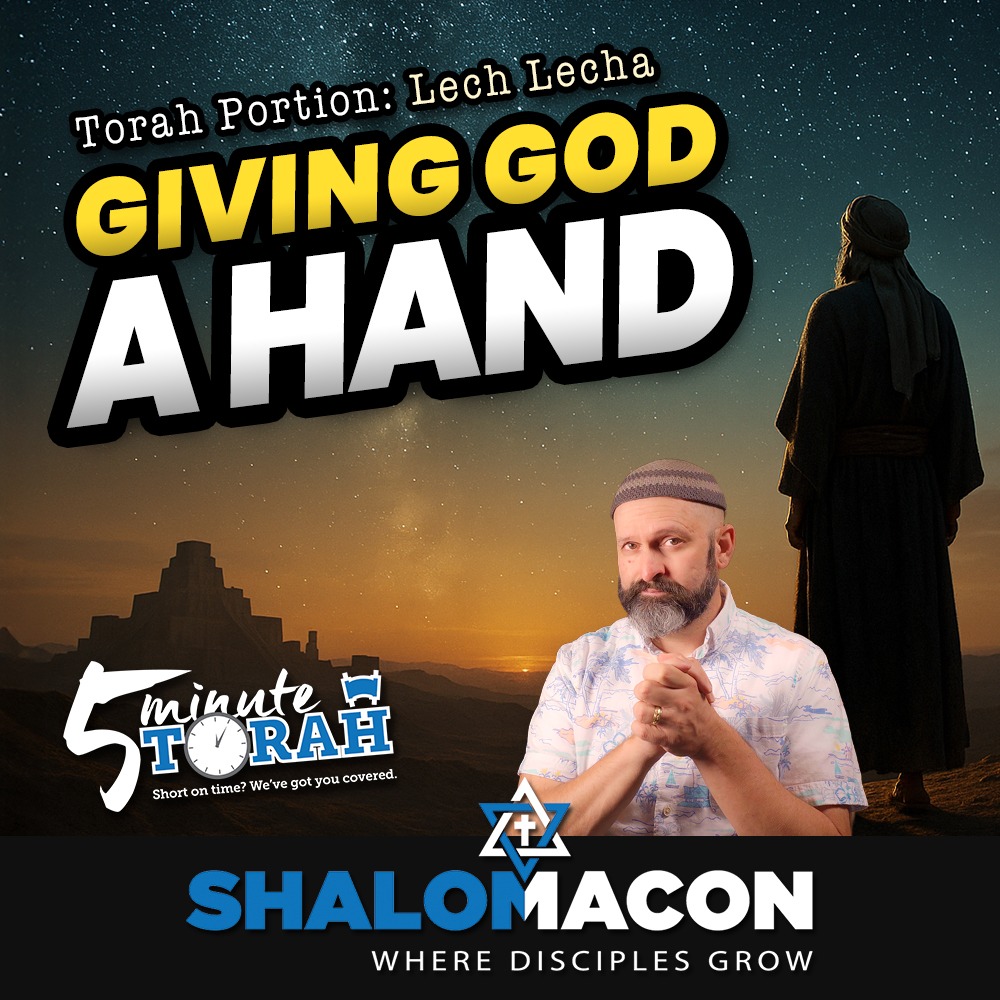Episode Transcript
[00:00:16] Speaker A: We are approaching what is called Zeman Herutenu. Say it with me, Zaman.
Gotta get that.
Thank you.
The season of our redemption. The season of liberation. The season of freedom. This is where we're headed. I've mentioned it now several times. Shabbat Hagadol. The big Sabbath. Right. And so I want to have a season of freedom quiz. It's very easy questions. Okay, I've already given you most of the answers. What is the holiday that Zaman heru tenu is a part of?
Sorry.
Thank you. Don't be afraid. These are easy questions.
Passover, Chag Hamatsot. The days of unleavened bread. Then we have the counting of the Omer. And then we count up to the festival of weeks. Shavuot. This is all part of Zaman Haruteinu. What is the freedom we're celebrating from? Freedom from what?
Slavery. Oppression. Very, very good. Where was Egypt?
Where was Israel? Thank you, Paul.
Where was Israel held captive.
Got it. How long was Israel enslaved in Egypt?
I'm going to take a guess from this side.
210.
215.
You've all over bid. Cody, you're the next contestant on be the rabbi for the day.
Well, the scripture answers the question. Actually, in Genesis 15, we read this. God said to Abram, know for certain that your descendants will be strangers in a land that is not theirs, where they will be enslaved and oppressed for 400 years. Who says the answer is 400?
Then we read Exodus twelve. That says, at the end of 430 years, on this very day, all the multitudes of the Lord departed from the land of Egypt. Who says 430 years?
I just read you the Bible. It says it.
There are actually several more figures given in Judaism. There is the number of 210 years. There is the number of 116 years. There is the number of 86 years.
Five.
Five opportunities. You ready for the lesson? I have gone over this, like, five times, trying to present it in a way that would be clear. I have yet to succeed. May God give me strength for this very moment.
You remember the covenant between the parts when Abraham made. God made a covenant with Abraham, and that is where he said to him at the covenant between the parts, your people, your descendants, will be held in slavery for 400 years. Okay.
400 years, your descendants will be held in slavery. Did he have any descendants at this point in the covenant between the parts?
The answer is no. He had a son 30 years later. His name was Isaac. His first descendant, Isaac.
Exodus counts back from the exodus to the covenant between the parts when it says 430 years to the day they left. That's from the covenant between the parts to the time they went out of Egypt.
But God tells Abraham, when you have a descendant, it will be 400 years. 400 years? From the time of Isaac's birth till the time they went out of Egypt. It's both.
What about the rest of these numbers? They're from Midrash. Someone said 210 years.
How could we get 210 years? Well, Jacob's family came to Egypt 210 years before they left Egypt after the Exodus.
So some count 210 years as the time when Israel was held in bondage in Egypt. There's another number. 116 years. How do we get that?
Well, Midrash tells us that the exit or the enslavement didn't really start until the pharaoh forgot about Joseph and all his brothers. So the last to die was Levi.
And from that point forward, from the death of Levi until the exodus was 116 years.
There's one more who wants to take a gamble on 86. How do we get to 86 years?
The time of the most intense persecution in Egypt began with the birth of someone whose name means bitter. She was born. Her name is Miriam.
From Miriam's birth until the time they left Egypt was 86 years. Okay, so for your biblical trivia, Alex. Not Alex. Who. Kin. Jeopardy. Kin. I'll take dates of the exodus for 200.
When someone asks you, how long was Egypt in. How long was Israel in exile? Was it 430 years? Was it 400 years? Was it 210 years? Was it 116 years? Or was it 86 years? Your answer is yes. Yes, that's it. Thank you. We got that done. Now, you might have thought that was the whole thing. Maybe you wanted that to be the whole message. But there's more I gotta tell you, because there's one more quiz question I wanna ask you.
Lama is the word in Hebrew.
Lama. An exile in slavery. An entire group of people. Lama.
Why?
Why was Israel held in captivity?
Anyone want to venture that's actually why you're here? I'm going to tell you so you don't have to come up with an answer. But it's a big question.
I recently did a teaching that was about the idea of the t shirt that says, the summary of all jewish holidays. They tried to kill us. We won. Let's eat.
Okay. I did a teaching at Maochoot about that, which really kind of focused on the idea. The fact that they tried to kill us is even a part of that little snippet. There's nothing funny about that, is there? They tried to kill us. Okay. But that got me thinking about Passover this week. As I'm reading and I'm really digging into the exodus and the enslavement, and I'm thinking to myself, what kind of holiday this is a holiday. It's a festival.
What kind of holiday should be built around the fact that an entire people were slaves and got out of it?
That I can only call this the Passover problem.
We celebrate this.
Why did it have to be birthed out of these circumstances, out of slavery?
We know that God allows suffering. We know this.
But for his purpose to be realized, it seems off.
I mean, to be one day enslaved is too many, much less 430 or 86 or whatever it is.
And speaking of years, I mean, the plan, the plan of God was known long ago. We just talked about the covenant between the parts. This didn't just pop up and happen. This was a prophesied thing. The plan was known before the Exodus. Now, in a way that you may not have seen, I want to show you something today, because fear not. Jewish tradition and the midrash has found this incredible parallel for you. I'm talking about the fact that when we look at the Torah long before the exodus, we can already see the exodus in one man's life.
His name was Abram at the time, and he's the one who received the prophetic word from God. Right? But listen. In Genesis twelve, Abram went down to Egypt. Why? Because there was a famine. In Genesis 45, the people of Israel went down to Egypt. Why? Because there was a famine.
To live there for a while. Abraham says, in Genesis twelve.
In Genesis 47, Jacob says, we have come to live here for a while.
Genesis twelve.
Abram says, sarah, listen. They'll kill me, but they'll let you live.
They'll kill the men. They'll kill me. You remember Exodus one? Pharaoh charged all his people. You are to cast every who male, every man that's born. You throw them in the river. But the women, you can let them live.
Plagues. What happened when they found out that Sarah was Abraham's sister, I mean, wife, Adonai struck Pharaoh and his household with great plagues. In Exodus twelve, what is the entire first part of Exodus about the plagues which struck Pharaoh?
They were urged to leave. In Genesis twelve, Pharaoh wanted Abraham. Just go. Get out. What happened in Exodus?
The Egyptians said, Israelites, just get out. In Genesis 13, Abraham left with what? Great riches and wealth?
After the exodus, how did Israel leave?
With silver and gold.
You see the incredible overlay of how far back this plan goes and how Abraham's life just plays it out.
And then there's another layer, though, that I want to talk about, not just the time and why it had to be, and that it was prophesied through the life of our greatest patriarch. There's another thing that God says about this celebration, that we've been let go from slavery.
The word is remember, remember, remember, remember. The whole Passover Seder is about remembering that we were once slaves in Egypt, but we were set free. Okay, that's good. That's a great thing. We want to remember that. But I want you to just take note of all the other remembering that we're called to do in the Torah, and it's not good.
The slave part, God commands over and over and over, remember the slavery. That's how the Ten Commandments start. It's the introduction to the relationship with God. Exodus 20, I'm the Lord your God, who brought you out of the land of Egypt, out of the house of bondage.
Remember that.
Exodus 13. Moses said, remember the day on which you went free from Egypt, the house of bondage. Leviticus 19 the stranger who resides with you shall be to you as one of your citizens. You shall love him as yourself, for you were strangers in the land of Egypt. Deuteronomy five remember that you were a slave in the land of Egypt. Deuteronomy 15, remember that you were a slave in the land of Egypt. Deuteronomy 16, you shall remember that you were a slave in Egypt. Deuteronomy 24. But you shall remember that you were a slave in Egypt, and the Lord your God redeemed you from therefore I command you to do this thing. Deuteronomy 24 22, you shall remember that you were a slave in the land of Egypt. And there are many, many more. Remember you were a slave.
That's a weird festival celebration, isn't it?
Even the Seder itself, we can't get away from it. At dinner, marore, recalling the bitter herbs, the bitterness of slavery.
It's painful. Was there no other way that Israel could have been prepared for the mission, the message, the chosen people? Right. This was the way.
Well, between the abrahamic parallels, the prophecy between the parts, the call to remember the remember the remember, remember this was the way. This is the way. It still is the way. We have to read it all the time. Why? Why did Israel become a nation this way?
Why do we celebrate and remember such a humble, basically humiliating origin story?
It's sort of humiliating.
Do you want to know?
It's a hard pill to swallow. It can be summarized in one hebrew word, anava.
You know that word, humility?
Humility, sometimes modesty. But Anava is much more than modesty or having a low self esteem.
It is about finding the balance between self respect and arrogance. To recognize one's own strength and weaknesses and understand your place in the world without feeling superior to anyone else. That is Anava.
And that perspective gives, then, a genuine assessment of you in relation to everyone else and to God.
This aspect of humanity, this should be aspect of humanity which is called humility, is the foundation of every other good attribute you can build in yourself. Do you know that? That's what Musar teaches over and over, Anava. Humility, humility, humility, build. It doesn't mean I'm a worm, and it doesn't mean I'm a king.
It means I know the balance. It is the foundation for people as individuals. So my question is this. If it's important for us, how much more important was it for God to instill in a nation of people who were tasked with changing the world, to understand their place in it?
How important is it?
Well, obviously, it's painful.
It's not something we want to remember, really. It's not a heroic story. It's not awesome. We didn't. We're not, like, taking off our desert garment and out comes the big superman. We rise to the. No, it's a painful story, but it's powerful.
It's very powerful. Let me expand this just a minute.
Many, many nations, if not almost all nations, begin with fighting.
They begin with territorial claims. Power struggles. To the victor goes the spoils. Right? Power is held by some and lorded over others. And this, actually, we find this even later in the Torah and in the prophets and David's kingdom and Solomon. I mean, there's war. There's stuff that happens.
But I'm talking here about the origin story of the nation, the why of the slavery. Why is this story? Why did Hashem decree that jewish people should begin our role as slaves in history? The answer is easy. Egypt was a nation building crucible. In Hebrew, it's called habarzel, the iron crucible, which has the power, explains Rashi, to purify gold and remove all the dross that is found in it. You know what the dross was? Pride and arrogance. And it's hard to hear it because I know, like God, there had to have been a better way.
But this is the iron furnace, this constant reminder found in the Torah. Remember, you were slaves. I brought you out from slavery. Remember, remember, remember where you came from. This speaks to a different kind of humility. There are three reasons that we find given in all of the texts about why Israel was put into slavery. Number one, trusting in God. Number two, the idea that they understood there is a master and we must humble ourselves before him. But third, the most important was humility, that they would emerge from this with an understanding of humility.
Yes, there is humility toward God, but this humility was to be toward other human beings, because nations are forged from strength, battle, status, money, power. And listen to me, Israel was nothing.
Nothing, had nothing, was nothing. The lowest of the low. No status, no rights, no opportunities, no future, no hope, no prospects. Slaves, it doesn't get any lower than that.
And looking back 430 years from the exodus, we know that that's the way God wanted it.
Anava.
That's the why.
Yes to God, but to each other.
And listen, it's illustrated most powerfully right now in the book of Torah that we're reading, which is called Leviticus. Yes, it's about sacrifices, blood, guts, livers and tails. But it also says this, if an outsider dwells with you in your land, you should do him no wrong.
The outsider dwelling among you shall be to you as the native born among you. You should love him as yourself, for you dwelled as outsiders in the land of Egypt. I am the Lord your God. Leviticus says it, the nation that God formed from nothing and nobodies was to create a world for everybody.
You understand that? That's what happened. Because, listen, in the ancient world, the Torah's ideals were revolutionary. Concepts like respect for human life, monotheism, social welfare, the rights of such disadvantaged people as widows, as orphans.
It just didn't even exist.
And the only way is in which Israel truly understood the mission and the scope and the importance and the audience was through these most humble of circumstances. That's what was happening. And yes, they learned to trust God, to know God brought us out from here. And there's a warning later that says, do not get too full of yourself. We read that later in deuteronomy. My strength and abilities created all this success for me. No, God says, I'll take you down from. But the nation of Israel were tasked with a calling much larger than themselves. Deuteronomy four. You'll remember it just as Adonai, my God commanded me, I have taught you. Moses says, statues and ordinances to do in the land that you're about to enter, to possess, you must keep and do them. For it is your wisdom and understanding in the eyes of the people who will hear all these statutes and say, surely this great nation is a wise and understanding people. Do you understand what's happening? You are to create a new world for all of the world, Israel. And you're starting down here and coming up.
The Torah has become, in civilized Places, the foundation of all the world.
That idea, it serves as a foundational text for jewish civilization, but also western thought, legal and ethical systems. Everything is based on it.
It's narratives, laws. This is a blueprint for society based on justice and compassion, the recognition of a moral order. The Torah mandates you treat people well.
Why would we do that? Why wouldn't we act like everyone else in the world who takes what they want? Because I want you to remember where you come from. You were the lowest of the low.
This is the story.
Even in God's commanded celebrations, we find the necessity to remember where we come from and include the world. We're about to have Passover. Then we'll go to Shavuot. And this text about Shavuot says, seven. You count for yourself. So you will rejoice before Adonai, your God. In the place Adonai, your God, chooses to make his name dwell. You, your son, your daughter, your slave, your maid. Levite, outsider, orphan and widow.
They're all invited to your party.
Religion is disgustingly exclusive. So often God commanded Israel to be available to all.
Hashem called him not for their glory, but for his. Not for their happiness, but for the nations. And it was this furnace of affliction.
There's a book called strive for truth by Eliyahu Dessler. He's also a Musar, Guy Michtav.
Sometimes you have to go to the lowest low before you can teach and appreciate the highest of highs.
He says every time that there's a need to give a righteous person the possibility of rising to a very high level. He's thrown into the worst environment so that he should learn that evil is futile and strive for higher. Remember last week? Not better, higher.
Strive for higher.
That's tough. We don't really want that. We don't want to be thrown into the furnace of affliction or the crucible of forming whatever. But it's true. Egypt was the world apart from God, where man believes he controls his own destiny. He takes what he wants without the feelings of others in mind. He enslaves another, an entire nation. Nation.
Because there's no compassion. And his needs in Egypt are all that matters. That is the world in which Israel learned exactly what not to be, what not to be. And they had to do it in a very, very hard way. His people, Leviticus, reminds us, are to be holy, for he is holy, that is, to be like him. And how do we know how he is? We find it written on the words of that scroll. Remember where you came from. Remember what I've done for you, and do it for other people, which should bring new life. I want it to bring new life to your Passover seders, when you read all of the remembering that's happening in the Torah, and to recall that many of the good parts of what we cherish in our society began in the shackles of slavery for the people who made it.
So there's something just in closing for the disciples of Yeshua, because Passover offers a unique opportunity to see this story in our own lives, because the truth is, and I want to remind you from Romans six that we, too, have our own story of slavery and futility of being hopeless without future. Romans six says, thanks be to God, that though you used to be slaves to sin, you've come to obey from your heart the pattern of teaching that has now claimed your allegiance. You have been set free from sin, have become slaves to righteousness. But remember where you come from.
Yeshua built a pretty solid foundation on that remembering thing. In one corinthians, when he had given thanks, he broke it and said, this is my body. Do this in remembrance of me. In the same way, the supper, he took the cup, saying, this cup is the new covenant in my blood. Do this whenever you drink it, in remembrance of me.
Just as Hashem asked Israel to create a better world, to build a new and better one, so guess what? You as disciples, jew, gentile, you have the same calling.
Build a better world. Remember where you come from.
Anava, humility.
And see, we are looking for a new world, a beautiful world to come. And Israel's slavery ultimately led to the chosen land, to the promised land, if only for a time. So we can take all kinds of time to reflect on the glorious future out of this world that we have. But if that's your real sole focus, if the buy and buy is what you really set all your sights on, you're missing the calling of the life you have been given to remember the Torah instructing Israel. Remember you were slaves in Egypt. Act accordingly. Yeshua says, remember me. Act accordingly. Even in this even, we're reading Metzorah, the Torah portion about lepers, and we see Jesus healing lepers and touching a woman with issues of blood. These are people that no one wanted anything to do with. A samaritan leper, he heals.
Why?
Because he wants us to follow in the example of remembering that we, too, can be as low, as low and have been raised by the power of God for good works, it says, for good works, to do good things, to be like Jesus. So at your tables, listen on Monday, Tuesday, at your seders, remember.
Remember who you are, where you've been, his teaching, his example, his gift. Emulate me, Yeshua says, in Anava, in humility, remember your calling. Don't just, I know it's like it's just another one of these messages. But don't, don't, don't just say, oh, he said some nice things. And that thing about slavery, that was pretty cool. Let's go eat.
Let it stop long enough between your ears to really think about how you can be the best version of you in the world, someone who was raised up to do good and amazing things for the world in which we live.
That's what I want you to do at Passover. Yeah, you can eat matzah and bitter herbs, and you need to remember it. You read the stories and we do all these things.
But the festivals are part of your elevation process.
They're supposed to make you better.
So let it make you better.
Let it be really remember where you came from, why, how you got here, and what you're going to do with the gift. And so with that, I will tell you early chag Pesach sameach.
Let it be real and powerful.
[00:32:51] Speaker B: Shabbat ShAlom please visit our website, shalomakin.org, to learn more about us. Join our live services, access other teachings, sign up for our newsletter, join our private network that will connect you with our greater community from around the world, or contribute to the work of Shalom Macon, thank you for watching, and we look forward to connecting with.



